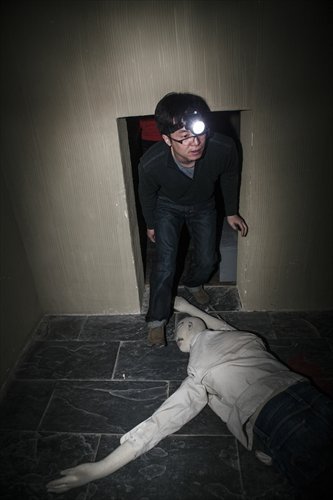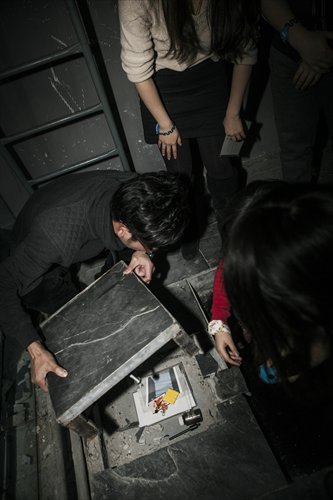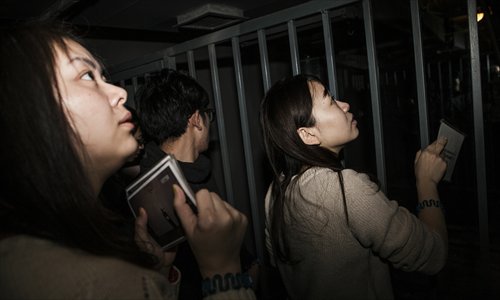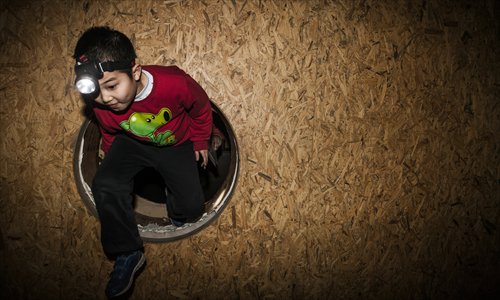Choose your own adventure

A player prepares to step over a fake corpse in his quest for a treasure chest in the ancient tomb game at role-playing theme park Action. Photo: Li Hao/GT
In a dark sewer underneath a museum, a team of eight burglars meticulously prepares their silent break in. Studying a blueprint illuminated by their headlamps as water drips in the background, the group discusses how to sneak into the museum without setting off its alarm or alerting security guards so they can steal an artwork.
It sounds like a scene from a spy-thriller movie or video game, but this is a fantasy brought to life where people test their stealth and intelligence. The museum is at Action, a role-playing theme park near the North Third Ring Road in Chaoyang district. Wang Bo and five partners launched the business in October 2013 after investing about 6 million yuan ($989,316).
Role-playing games are the next evolution of the "escape room" trend that has swept Beijing. First popularized in Japan, escape rooms require players to use clues to flee a maze of dark, eerie rooms. There are around 100 escape rooms in Beijing, but now several role-playing theme parks are enjoying a boom driven by customers who adopt adventurous personas to "escape" their real-life pressures.

Players find useful items under a stone slate in the museum game at Action. Photo: Li Hao/GT

Players watch on in despair after their four-digit code fails to unlock a door in the museum mission at Action. Photo: Li Hao/GT
Building teamwork
Action has five role-playing games, each with its own unique story line and setting. The goal for players is to find clues that help them perform tasks to achieve an overall objective.
"Everyone has a certain role to play in our games. Different roles have different objectives and tasks, which requires players to cooperate with each other and share information," said Wang.
In the museum mission, players are thieves trying to steal valuable artworks; in the ancient tomb, players must find a long lost family treasure and save a young sibling; in a mental asylum, players are both patients and rescuers plotting a break out; in the gang's hideout, players are police officers preparing a raid; and in the submarine, players are reporters covering its maiden voyage and spies seeking military intelligence.
Li Kuan, a 26-year-old tech developer, assumed the role of burglar for the museum mission along with his postgraduate classmates last Saturday.
"It's different from anything I've experienced before," said Li, who has now visited three different role-playing theme parks. "The scenarios are realistic, the stories are detailed and the sensory experience is extremely strong."
After breaking into the museum, Li and his friends encountered an infrared motion detector that required a flexible team member to sneak across without disrupting the beams. But panic set in when the young woman assigned the task put a foot wrong and triggered the alarm, causing the eight to flee to their previous room to hide. Everyone held their breath and kept silent for an anxious minute before regrouping.
Despite being undetected, the group failed to decipher a code to a locked door beyond the motion detector to advance to the next room that held the artworks.
"We didn't make it in the end. I think the limited amount of time was the main reason. One hour is too short," Li said. "It was kind of frustrating. The staff refused to tell us what was in the next room, so we decided to try again another time."

A player tries to crack a code that will open a treasure chest in the ancient tomb game at Action. Photo: Li Hao/GT
Keeping it family friendly
Young adults aren't the only ones who indulge in role-playing games. Wan Liping and her husband participated with their sons, aged 7 and 11, in the ancient tomb mission at Action last week.
The family found the treasure chest, but were unable to unlock it. "The boys were just there for fun. I had hoped the game would build their courage," said Wan. "I think they are still too young to play the game. They told me they were a little scared when we saw a fake corpse in the last room."
Wang said initially the goal was to make Action "more frightening" than other role-playing theme parks. Originally, players who triggered the alarm in the museum would be chased by a guard and sound effects in ancient tomb were creepier.
"However, we decided catching players who triggered the alarm wasn't popular. Most players aren't slim or nimble enough to get through [the infrared beams]. We used to have a group of overweight people who could never pass it," said Wang. "In the ancient tomb, a woman in her 20s became so spooked by sound effects that she screamed and ran into a wall, knocking herself out. We decided to cut some of the scary elements after that."
Inspiration from classics
Action's unique selling point is that all its missions are original, but many other role-playing games are based on famous novels, movies and video games.
Unlike Action which spans more than 1,000 square meters, rival theme park Daomu Weicheng operates out of a 100-square-meter studio in Wudaokou, Haidian district.
Daomu Weicheng, which roughly means "grave robbers under siege," has had more than 1,000 customers since it opened in December 2013. Its three missions in separate rooms - Canglongxue (tomb within a tomb), Qixing Yiguan (seven mysterious coffins) and Jiutou Shebai (a giant "devil tree" filled with treasure) - are inspired by fictional series Grave Robbers' Chronicles by Nanpai Sanshu, a popular Chinese writer of mystery and adventure novels.
Shi Ruiwen, an avid reader of Grave Robbers' Chronicles, visited Daomu Weicheng with three friends on February 17. They played the Jiutou Shebai game, for which they were given a crowbar and flashlights before starting. The group had a rocky start when they triggered a booby trap early on, but the tense atmosphere gradually eased as they laughed at each other's struggles squeezing through narrow passageways.
"The 'devil tree' was almost exactly how I imagined it [in the novels], which was exciting. We also enjoyed the physical and intellectual challenges," said Shi.
Daomu Weicheng owner Yang Baotong, 22, said the inspiration for his business was The Tale of King Mu, Son of Heaven, a mythical account of the travels of King Mu, who ruled during the Western Zhou Dynasty (1046-771 BC).
"The inspiration of Grave Robbers' Chronicles comes from a myth, but our missions are based more on fan-fiction stories," said Yang.

A boy steps through a passageway while playing the ancient tomb game. Photo: Li Hao/GT
Need for innovation
The role-playing theme parks Yang plans to open in future will break away from the grave-robbing theme and be based on the prequel of Chinese Paladin 3, a popular video game produced in 2003 and adapted into a TV drama in 2009.
Like the Slam Dunk sport-themed manga series in Japan and American sci-fi franchise Star Trek, the Chinese Paladin game series are hugely popular with the post-1980s and -1990s generations in China.
Yang consulted with Wang Shiying, producer of Chinese Paladin 3, when designing his role-playing game. He also secured the rights from video game maker Softstar Technology to ensure his game would be official and not a cheap knockoff.
Yang plans to build four new theme parks in future, with one slated to open next month in a 300-square-meter basement near the Yonghegong Lama Temple.